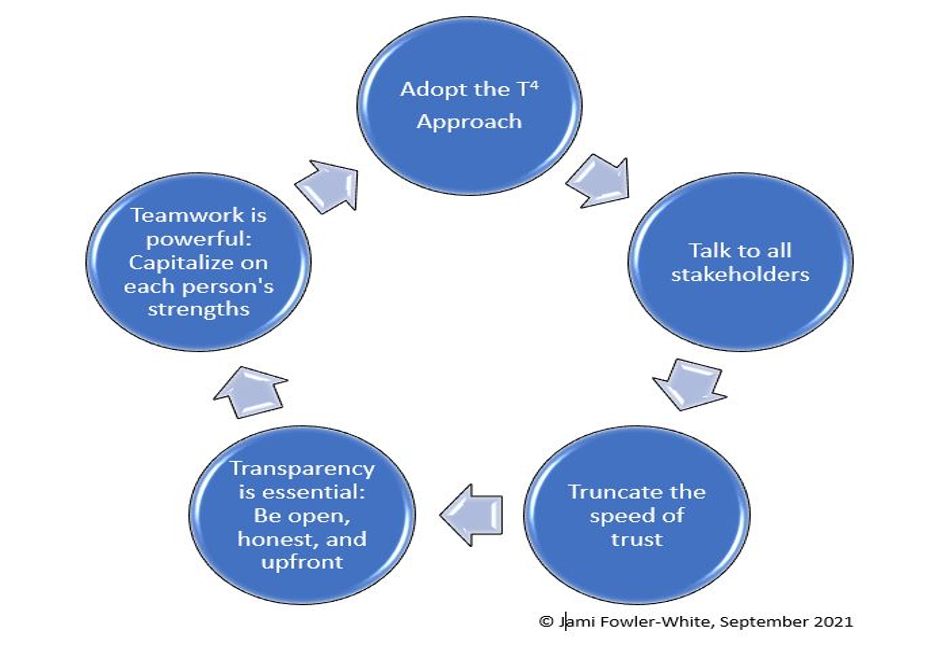Imagine embarking on the biggest challenge of your life while living through a pandemic. That’s exactly what I will be sharing each month as I work, learn, and grow my leadership skills (with some serious on-the-job training) as I go forward in my first year as a Pandemic Principal. As I have now completed my first month, here are my “aha” moments, what I have learned, and suggestions for moving forward as leaders.
As I reflect on the trajectory of my educational career, I can honestly say that opportunity often knocks when you least expect it. You may be thinking to yourself, I’m not cut out to do this, but in this moment at this time, you are exactly what children and teachers need. You were made for this job. The experiences you have had along the way will serve as your guide, and it will be important to keep a pulse on your mindset along the way. Doubt is the enemy that will attempt to creep in minute by minute with every decision that you have to make. You must think positively and trust that you have what it takes to lead, guide, and shape the path for teaching and learning. These are the words that I keep reminding myself of each day, because this is easier said than done, especially when leading a school during a Pandemic.
Lesson #1: Squashing fixed mindset triggers is essential
Mindset is your mental attitude. Believe it or not, you are in control of how you look at the world. If you choose to focus on the things that are going wrong, this is all you will see. As you take on the responsibility of leading a school, you must be intentional about finding the positive points within your day. There will be numerous decisions for you to make at any given moment. Some will have positive outcomes, some will not. Don’t beat yourself up in those moments when you feel like the pressure will be all consuming. It is in these moments that you must remember your strategy for squashing your fixed mindset triggers. Fixed mindset triggers are those things that close your mind off to the possibility of growing and moving forward. To break out of the fixed mindset slump, the key is first identifying the cause, determining the lesson you learned in that moment, and looking at things as a way to grow and get better (Fowler-White, 2020). In this role, doubt may be one of the worst fixed mindset triggers that you face. What is your strategy for removing and overcoming feelings of doubt or inadequacy? One strategy that I am using is to take a moment to breathe and remember that my concentration should always be on doing what is best for students. At the end of each day, I take time to write down 4-5 things I have accomplished. Self-reflection is the key to moving forward with positivity. Self-reflection involves “internalizing all aspects of your practice. This includes examining the good, the bad, the ugly—and then determining what you have learned from the experience” (Fowler-White, 2021, p. 16). One method I use daily to self-reflect is to write down 3-4 positive moments that took place within the day. Keeping track of these powerful points helps you move forward with purpose, precision, and an optimistic mindset. Maintaining this type of mindset will help to remove doubt and keep your mind clear for the critical decisions that you will inevitably need to make throughout each day.
Lesson #2: Moving forward with precision
Now that you are officially in the seat, you will be faced with the most important decision you will ever have to make—where should your attention be placed? Don’t worry. It is my hope that you thoroughly analyzed all aspects of the community you have joined prior to applying and taking your new job. Think back. When applying for the position, you undoubtedly had to endure several rounds of interviews where you were asked a plethora of questions about what your approach would be if you were chosen as that school’s leader. You likely had to create a plan of action outlining what you would do within the first 90 days. It is this plan that was seen as the best approach for your particular school. Therefore, your goal should be to move forward with accuracy and precision using the strategies and actions outlined within your original plan. While implementing these strategies and actions, consider using the T4 approach to help you make the most of your first month as a school leader.
Aligning your focus using the T4 Approach
Everything you do during the first month is critical. My advice is to align your focuses to the four “T” approach:
- Take Time To Talk
- Truncate the Speed of “Trust”
- Transparency: Be upfront, honest, and open
- Teamwork: Capitalizing on each person’s strengths

Lesson #3: Take time to talk
When you are the new kid on the block, your first objective should be to talk. When I say talk, I mean that you should listen while others talk. You should spend your first few weeks talking to everyone who works within your building. As the new person in the building, having conversations with all your stakeholders will help you understand the culture—written and unwritten rules of engagement, what is valued, and the direction that each person hopes you will take. This is valuable information which will help you establish goals, figure out what is important, and is vital to building a team-oriented culture.
Lesson #4: The speed of trust
With minimal time to spare, it is important to build trust quickly. PositivePsychology.com offers several suggestions for building trust. The first is to remember that it takes time to develop and gain trust. Devote time each day to building trust by ensuring that you prove that you are true to your word. People want leaders who are reliable. Every word you say will be remembered and analyzed. Choose commitments carefully. When meeting with stakeholders, take notes, and use what you learn to prove to everyone that you were listening and value the ideas and recommendations of each person. Lastly, be nice. Having a pleasant personality goes a long way. Being authentically kind to people is also essential in building trust (Craig, 2020).
Lesson #5: Teamwork
Empower others. Although you may have been accustomed to doing things alone, your new role comes with responsibilities that you can only dream of. There will be so many tasks, people vying for your attention, and many items that will be due simultaneously. You will not be able to survive if you are attempting to do the work alone. After gaining the trust of people within the organization and getting to know them through the conversations, take the strengths you identified and use them to empower your team. One of the most important components of teamwork is to make sure everyone on the team understands where they fit in. A simple strategy to ensure this is to list all the responsibilities for each member of your admin team in a document and review these tasks/duties during your first team meeting. It is also good to do this with teacher leaders within the building as well.
Lesson #6: Teachers are the experts
Treat teachers like the experts they are. As you begin to prepare plans for implementing systems and routines, enlist the ideas, support, and recommendations of the teachers. Teachers are the front-line workers and backbone of any school building. They know what is working, not working, and will welcome being asked to help craft action steps for moving forward. Remember, you may not have ever seen what the building was like when children were present.
Within my first month leading a school within a Pandemic, these are the six most important lessons I have learned thus far. Mindset, moving with precision, and focusing on the four “T” approach have helped me progress smoothly over the past 30 days. I look forward to continuing to share more lessons and “aha moments” along the way. The work we do is both challenging and rewarding. Lastly, I want to remind each of you of a quote by John F. Kennedy which says, “Leadership and learning are indispensable to each other.” Keep leading and learning. That’s what is most important as change is constant and becoming a central factor of our daily lives. Let’s continue to reimagine how we approach teaching, learning, and leading as the Pandemic rages on.
References
Craig, H. (2020). 10 Ways to Build Trust in a Relationship.
Fowler-White, J. (2020). Practices that Promote a Growth Mindset.
Fowler-White, J. (2021). Educator Reflection Tips, Volume II: Refining Our Practice.
Photo Credit: DepositPhotos.com







